Papers by Jennifer Charteris

The Australian Journal of Teacher Education , 2018
There is growing interest in innovative educational space design and the relationality of spatial... more There is growing interest in innovative educational space design and the relationality of spatialised teaching practices. This paper addresses the characteristics of spatialised professional learning in newly redesigned or purpose built new generation learning environments (NGLE). The case study is situated within Aotearoa/New Zealand context, a country where there has been considerable policy focus and investment in NGLE. Data from principals who have established NGLE in their schooling settings is analysed, with consideration given to the preparation of teachers to take up spatialised practices. The study highlights key characteristics of spatialised PLD practice – fostering spatial literacy; professional cross-pollination; co-teaching and peer coaching; deprivatisation and bespoke professional learning design. The value of this research lies in its contribution to researchers and practitioners in the schooling sector as they consider approaches to professional learning in NGLE.

Across Organisation for Economic Cooperation and Development countries there is a systematic rese... more Across Organisation for Economic Cooperation and Development countries there is a systematic research and policy impetus for continuous schooling engagement with digital technologies, improvement agendas and the commensurate redesign of educational spaces (OECD, 2013). The current epoch marks a transformation between what has been termed the industrial society and the knowledge age. In this article we consider implications of the shifting currents in globalised societies for school practitioners and how moves to Innovative Learning Environments (ILEs) (also called new generation learning environments (Imms, Cleveland & Fisher, 2016) may require close attention if the potential of spatialised practice is to be realised. Innovative learning environments are new generation schooling contexts where space and objects influence and produce spatialised practice. Spatialised practice, in this context, is indicative of a re-examination of classroom relationality. Moreover, it is an embrace of the fluid and flexible re-design of learning spaces alongside ongoing evaluation and reconsideration of curriculum, pedagogy and assessment (Blackmore et al., 2011b). Within ILEs, an engagement with spatialised practice can afford learner agency. Massey (2005) makes three propositions about space, that it is a product of interrelations, a sphere of coexisting heterogeneity and multiplicity, and always in process and under construction. Deploying Massey’s (2005) three dimensions of space, we consider spatialised relations in schooling settings. Principal interview data is used to illustrate aspects of spatialised practice.

The impetus to move to a new generation learning environments places a spotlight on the relationa... more The impetus to move to a new generation learning environments places a spotlight on the relational dynamics of classroom spaces. A key feature is the notion of learner agency. A complex notion, learner agency involves both compliance with and resistance to classroom norms and therefore is far more sophisticated than acting in acquiescence to expectations. This article traces a taxonomy of agency in education settings. The taxonomy details: sovereign agency of self-determination theory, relational agency linked with sociocultural theory, ecological agency -a temporally embedded process of social engagement, and emerging new material agency. Although the latter is starting to gain traction in Education research, it is yet to be explicitly recognised as an important consideration for educational practice. Consideration is given to this typology in light of case study data from school leaders who comment on learner agency in the context of new generation learning environments
This paper provides a critical and contextualised exploration of assessment for learning (AfL) as... more This paper provides a critical and contextualised exploration of assessment for learning (AfL) as an important area of scholarship in higher education, particularly in online learning environments. Although AfL can speak to a range of education discourses, the specific focus here is on the performativity and experiential learning discourses around individual and collective notions of AfL in online settings (e-AfL). We argue that e-AfL practices that emphasise performativity and are used primarily for technicist purposes impoverish their potential to promote learning. We explore the existential notion that e-AfL can transcend formulaic and procedural interpretations of formative assessment in higher education. Rich, divergent approaches to e-AfL can support students in higher education courses to develop their funds of identity, thereby enhancing learner reflexivity and agency.

Acknowledging an abundance of technicist models for teacher continuing professional development (... more Acknowledging an abundance of technicist models for teacher continuing professional development (CPD), the authors draw from Deleuzoguattarian theory to frame peer coaching as rhizomatic practice. Rhizome theory enables engagement with the creative breaks and departures in peer coaching assemblages. Agentic and innovative teacher learning can occur when teachers can take lines of flight to think differently about their teaching practices. Deleuzoguattarian notions of rupturous lines signal teacher-generated possibilities for new initiatives. Located in an Aotearoa/New Zealand facilitated inquiry CPD context, the article explores how nine teachers engaged in a formal process of collaborative dialogue. A rhizomatic approach to dialogue encompasses a dynamic view of teacher learning. Openness to emergence can enable educators to theorise pedagogy creatively to potentiate a multiplicity of pathways forward.
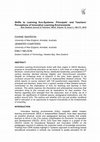
Innovative Learning Environments (ILEs) with their origins in OECD literature, propose to revolut... more Innovative Learning Environments (ILEs) with their origins in OECD literature, propose to revolutionise education as we know it. ILEs draw on a large body of literature: constructivist learning theory; distributed leadership; personalised 21st century learning; blended learning (digital); and, future-focused education. Despite an increasing body of research in the area, there appears to be confusion around the concept of ILEs in Aotearoa/New Zealand schools. This article reports on survey research with 126 questionnaire respondents. These principals and teachers, drawn from a random sample of New Zealand schools, commented on the implications of ILEs for teaching and learning in their contexts. This article explores the theoretical and philosophical resources that educators bring to this concept and its implications for their practice. Five themes regarding ILEs emerged from the responses: lack of clarity; we do it already, the significance of material spaces; pedagogical implications; and, the politics around ILEs. The authors ask whether ILEs are just another neoliberal shift in education or an opportunity to respond innovatively to the fundamentals of schooling.

Research on youth subjectivities and disappearing media is still in its infancy. Ephemeral techno... more Research on youth subjectivities and disappearing media is still in its infancy. Ephemeral technologies such as Snapchat, Frankly and Wickr offer young people opportunities for discursive agency, harnessing teenage discourses ofto social positioning. These media facilitate social mobility in teen peer contexts by providing a medium for dynamic and shifting peer relationships. The transmission of digital images can enable a social flexibility that has a significant impact on youth subjectivities where discursively constructed relational identities are brokered through cyber technologies. We tackle the question “what discourses are evoked and produced through in the discussion of disappearing social media?” by exploring two parents’ accounts of their children’s use of this media. We also examine a discourse of innocence that surrounds teens’ use of social media and, in particular, ephemeral applications, by sexting and cyberbullying. We engage in the debate on the use of ephemeral social media to consider the discourses influencing youth subjectivities and the nature of networked publics.
Critical Studies in Education, 2015
ABSTRACT
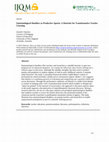
The International Journal of Qualitative Methods
Epistemological shudders offer teachers and researchers a valuable heuristic to gain new perspect... more Epistemological shudders offer teachers and researchers a valuable heuristic to gain new perspectives on classroom dynamics. As a means for reflexivity, they involve turning one's reflexive gaze on discourse. Although this shudder metaphor has been used to produce puzzles and paradoxes to explore regimes of truth in early childhood contexts, it remains under theorised. The study's conceptual framework utilises Judith Butler's notion of performativity which precludes a prediscursive autonomous subject. Butler's view suggests that identity is a continuous process of reiterating and resignifying one's position within and across discourses. Through this performance repetition, an illusion of a stable fixed identity is created. In keeping with a view of poststructural research which troubles or disrupts the "taken for granted" in the interests of social justice, the approach to discourse analysis taken in this study supports a deconstruction of unproblematised classroom discourse. During a research interview, the use of a discourse analysis tool prompted epistemological shudders that enabled a teacher to review her beliefs about how she positioned students in her classroom and the researcher to problematise essentialist notions of agency. The study illustrates how epistemological shudders can prompt teachers and researchers to trouble unquestioned assumptions as part of a dynamic learning process.
Curriculum commentators have well documented participatory pathways for key competency developmen... more Curriculum commentators have well documented participatory pathways for key competency development . However, there is a paucity of New Zealand research that takes a poststructural view of how competencies play out in classroom discourses. It is the contention of this paper that, rather than 'having' agency to transfer competencies from one situation to the next, competencies can be produced and enacted as learners shift subjectivities across discourses. The findings are particularly relevant to New Zealand schooling contexts that seek to embed key competencies into day to day classroom practices. Located in a year nine English classroom of a regional high school, this analysis furnishes an example of learner agency in action when a student navigates classroom discourses to take up a position as both a novice writer and a leader.

As more than just knowledge and skills, The New Zealand Curriculum (Ministry of Education, 2007) ... more As more than just knowledge and skills, The New Zealand Curriculum (Ministry of Education, 2007) key competencies encompass dispositions for lifelong learning (OECD, 2005). A range of studies associate learner agency within the dispositions that are embedded in these key competencies (Carr, are strongly anchored in an essentialist frame-work. Interpreted this way, competencies can be likened to a virtual backpack that students carry about and draw from at will. A discursively constituted view of identity would suggest that this is not the case. Employing Davies' (2010) conception of a subject-of-thought, where the subject is under erasure, the paper explores what agency as dispositionality can look like when it is performatively constituted in a competence-oriented curriculum (Ministry of Education, 2007). Rather being attributed static, essentialised identities, students are co-constituted in classroom discourses. The research has implications for how educators recognise moments when students agentically mobilise personal, social and discursive resources in the classroom. This article presents an argument for a dynamic theory of agency that incorporates a rhizomatic view of learner participation and interrupts essentialist interpretations of dispositionality. It opens up possibilities for new conceptions of key competencies as performative discursive practices.
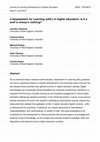
As an extensive body of research demonstrates, Assessment for Learning (AfL) practices can have a... more As an extensive body of research demonstrates, Assessment for Learning (AfL) practices can have a significant impact on student achievement in the schooling sector and over the last decade these practices have gained currency in higher education settings. Digital technologies are increasingly being embedded into university programmes, therefore it is important that the issue of quality learning as socio-political engagement in online higher education settings be carefully examined. In this article the authors, a group of pre-service teacher educators who work with students undertaking initial teacher training, explore key discourses that underpin the application of AfL in higher education digital contexts -eAfL (e-Assessment for Learning). In particular, we critique discourses of 'learnification', 'responsibilisation' and 'performativity' in relation to eAfL. We pose possibilities to be considered for the development of robust practices that promote agency and engage with students' funds of knowledge, as the socially and culturally located knowledge, skills and dispositions that learners bring to higher education contexts.
A market-driven model for in-service teacher development can potentially place the sustainability... more A market-driven model for in-service teacher development can potentially place the sustainability of professional learning initiatives at risk. As schooling improvement contracts become increasingly student outcome driven, we question whether this could compartmentalise processes of teacher learning. With an emphasis on fixed fiscal input and resulting student outcomes, inservice teacher educators (ISTE) and teachers are in the middle charged with making a significant difference. What are the practices that make this space in the middle a place where agentic learning takes place? Adopting a polemic stance, we invoke the ‘between a rock and a hard place’ metaphor to illustrate the way teachers and ISTE are currently politically positioned.

The study described in this article is of international interest in that it explores the engageme... more The study described in this article is of international interest in that it explores the engagement of teachers in their own professional learning and the emergence of co-leadership capabilities (Darling-Hammond, 1998; Opfer and Pedder, 2011; Thibodeau, 2008). This can occur through a dialogic feedback process where teachers can be positioned as experts in their own practice and as co-leaders activating the learning of others. Through purposeful dialogue centred on classroom data, teachers can influence each other's professional learning. This qualitative case study comprised research into the interactions of teachers in peer-coaching groups located in the context of their schools. The study highlights how emphasis can be shifted from the role associated with the designated title of leader to the purpose and relevance of teacher leadership in the context of dialogic peer coaching. Communities of inquiry can support the development of high capacity teacher co-leadership in school...
Teaching and Teacher Education, 2015
Dialogic feedback afford teachers decision-making space to improve students' learning outcomes. A... more Dialogic feedback afford teachers decision-making space to improve students' learning outcomes. Agency in teacher learning contexts centres on the affordance of intellectual space to think. Agency can be seen in relational positioning during dialogic feedback collaborations. Teachers can explore with repertoires of possibilities during dialogic feedback. Teachers can links between cultural, structural and material domains of their learning contexts.

Teachers and Curriculum, 2013
Seven years ago The New Zealand Curriculum (NZC) was launched with its emphasis on key competenci... more Seven years ago The New Zealand Curriculum (NZC) was launched with its emphasis on key competencies as "the capabilities that young people need for growing, working, and participating in their communities" (Ministry of Education, 2007, p. 38). This raises the question of what dispositions are required for students to strengthen these capabilities? Curriculum commentators advocate that teachers should monitor how students take risks so that their capabilities are stretched as they perform real tasks in real contexts. The purpose of this paper is to contribute to the ongoing conversation on what key competencies can look like in New Zealand classrooms. Specifically, it focuses on learner agency as an important and undertheorised dispositional element of the key competencies. The paper reports on a discourse analysis that explores how students can act agentically in a secondary classroom. By providing a rich example of learners taking risks in their learning as they enact key competencies, this paper reveals that agency can be both dynamic and unexpected.

Research on youth subjectivities and disappearing media is still in its infancy. Ephemeral techno... more Research on youth subjectivities and disappearing media is still in its infancy. Ephemeral technologies such as Snapchat, Frankly and Wickr offer young people opportunities for discursive agency, harnessing teenage discourses of social positioning. These media facilitate social mobility in teen peer contexts by providing a medium for dynamic and shifting relationships. The transmission of digital images can enable a social flexibility that has a significant impact on youth subjectivities where discursively constructed relational identities are brokered through cyber technologies. We tackle the question ‘what discourses are evoked and produced in the discussion of disappearing social media?’ by exploring two parents’ accounts of their children’s use of this media. We also examine a discourse of innocence that surrounds teens’ use of social media and, in particular, ephemeral applications, by sexting and cyberbullying. We engage in the debate on the use of ephemeral social media to consider the discourses influencing youth subjectivities and the nature of networked publics.
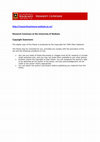
This thesis is premised on “a politics of becoming” (Gowlett, 2013, p. 149), a
Deleuzo-Guattarian... more This thesis is premised on “a politics of becoming” (Gowlett, 2013, p. 149), a
Deleuzo-Guattarian notion which speaks to social justice research. Rather than
a focus on reductionist reformist politics, I explore moments of possibility as lines of flight that disrupt dominant discourses.
As outlined in the New Zealand Curriculum, New Zealand schools are charged with the task of strengthening students’ key competencies (Ministry of Education, 2007a) to lay a foundation for lifelong learning. Learner agency is embedded in a dispositional view of these competencies but there is a paucity of research from a poststructural perspective in this area from New Zealand.
Agency is also fundamental to a sociocultural conception of assessment for learning (AfL) where learners initiate, participate and contribute to learning in their classroom communities. Positioned in theoretical landscapes of
socioculturalism and feminist poststructuralism, this study investigates agency through a rhizo-textual analysis in two year nine classrooms. The dynamic poststructural view of agency theorised in this thesis is derived from Judith
Butler’s (1993) notion of performativity which precludes any prediscursive autonomous subject.
Using data from episodes in two year nine classrooms I explore: how students engage as authoritative, active participants, authoring and directing their own actions in social activity within multiple discourses; how students move themselves from one set of culturally and socially structured subjectivities to another; and how agency can look, sound and feel in the discursive space of the classroom. In keeping with a rhizoanalytic approach, I construct plateaus of discourse based on episodes of classroom activity. These three short episodes of classroom discourse serve to illuminate the subjectivities in play.
There are two forms of analysis used to construct these plateaus. Firstly, conduct a discourse analysis of identity affordances and discourses to examine the nature of learner positioning. I then use rhizo-textual analysis (Honan &
Sellers, 2006) to map the students’ and teachers’ moves in discourse and shifting subjectivities.
The findings highlight how agency can appear as a rapid series of rhizomatic discourse moves that take place as students and teachers deterritorialize and
reterritorialize discourses as they enact specific identities. They resonate with
Davies’ (2000) observation that learners can accept, resist, subvert and change or ignore a range of discourse positions. The study also illustrates that what can appear to be ‘off-task’ behaviour can be also read as highly agentic.
The dynamic and rhizomatic theory of agency proposed illustrates that learners can inhabit multiple subject positions across discourses as they respond to the interpellations of their teachers and peers. Rather than a performance where individuals act out roles as pre-discursive identities, students exercise performativity within and across classroom discourses as they are constituted agentically through their lines of flight.
The research makes a methodological contribution through combining sociocultural and poststructural theories to explore the discursively constructed social and cultural environments of two classrooms. This is a deterritorializing move away from conventional sociocultural learning theory to incorporate an ecological (Boylan, 2010), rhizomatic view of classroom participation.
This research has implications for how educators conceptualise learners’ identities and provide affordances for learners to initiate learning and take up agentic positions in classroom discourse. It also has implications for the ways in which the key competencies can be interpreted and strengthened in classrooms.
Rather than ‘having’ agency to transfer competencies from one situation to the next, competencies are produced and enacted as learners shift subjectivities within and across discourses. The findings also offer students, teachers and policy makers insight into the learning dynamics of classrooms which embody the ‘spirit’ of AfL (Marshall & Drummond, 2006) where students can be afforded opportunities for lines of flight to initiate learning. Through being aware of learners’ rhizomatic moves, teachers may be able to notice, recognise and respond to learner initiatives more readily, and assist them to develop their capacity to be agentic learners.

Produced through market relations of neoliberal managerialism, teacher subjectivities are becomin... more Produced through market relations of neoliberal managerialism, teacher subjectivities are becoming progressively commodified. With the increasing casualisation of the teaching workforce, the well-being and status of casual relief teachers (CRTs) can be seen as an area of concern, at risk of ‘flexploitation’. More than just a convenient labour pool, CRTs operate on the margins of school communities, a space fraught with a range of issues. In many instances, CRTs experience less job satisfaction; less rapport with students and colleagues and less access to school information, professional development, resources and teaching materials. This article draws on a positioning theory to frame the discursive production of CRT selves within the neoliberal milieu. It offers a detailed analysis of collective biographies that explore narrative formations of casual teaching. Schooling discourse is replete with metaphorical language that frames teacher positioning, and a range of existing metaphors in CRT literature highlight their vulnerability in particular. Rather than offering an analysis that addresses casual teacher performance as a problem to be solved, this article proposes that the relation- ship between ‘structural marginalisation and the ‘othering’ that CRTs can experience is associated with the politics of market-related performativity.
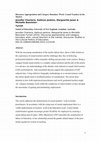
With the increasing casualisation of the teacher labour force, there is little written on the exp... more With the increasing casualisation of the teacher labour force, there is little written on the experiences of casual teachers and the challenges they face in brokering professional identities within constantly shifting and uncertain work contexts. Being a category bound casual teacher (a product of category boundary work) is a complex subject position. The aim of this article is to advance our understandings of the identity work inherent in casual relief teachers (CRTs) performativity. Anti-essentialist theories support this exploration of CRT subjectivities and processes of discourse appropriation. Using collective biography methodology as re- storied memory work, this article speaks back to neoliberal politics of casualisation. The stories draw attention to how both experienced practitioners and newly graduated teachers might ‘do’ category boundary work within the complexity of school politics as they navigate the uncertainty of gaining and maintaining employment in the Education market.


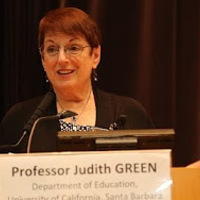







Uploads
Papers by Jennifer Charteris
Deleuzo-Guattarian notion which speaks to social justice research. Rather than
a focus on reductionist reformist politics, I explore moments of possibility as lines of flight that disrupt dominant discourses.
As outlined in the New Zealand Curriculum, New Zealand schools are charged with the task of strengthening students’ key competencies (Ministry of Education, 2007a) to lay a foundation for lifelong learning. Learner agency is embedded in a dispositional view of these competencies but there is a paucity of research from a poststructural perspective in this area from New Zealand.
Agency is also fundamental to a sociocultural conception of assessment for learning (AfL) where learners initiate, participate and contribute to learning in their classroom communities. Positioned in theoretical landscapes of
socioculturalism and feminist poststructuralism, this study investigates agency through a rhizo-textual analysis in two year nine classrooms. The dynamic poststructural view of agency theorised in this thesis is derived from Judith
Butler’s (1993) notion of performativity which precludes any prediscursive autonomous subject.
Using data from episodes in two year nine classrooms I explore: how students engage as authoritative, active participants, authoring and directing their own actions in social activity within multiple discourses; how students move themselves from one set of culturally and socially structured subjectivities to another; and how agency can look, sound and feel in the discursive space of the classroom. In keeping with a rhizoanalytic approach, I construct plateaus of discourse based on episodes of classroom activity. These three short episodes of classroom discourse serve to illuminate the subjectivities in play.
There are two forms of analysis used to construct these plateaus. Firstly, conduct a discourse analysis of identity affordances and discourses to examine the nature of learner positioning. I then use rhizo-textual analysis (Honan &
Sellers, 2006) to map the students’ and teachers’ moves in discourse and shifting subjectivities.
The findings highlight how agency can appear as a rapid series of rhizomatic discourse moves that take place as students and teachers deterritorialize and
reterritorialize discourses as they enact specific identities. They resonate with
Davies’ (2000) observation that learners can accept, resist, subvert and change or ignore a range of discourse positions. The study also illustrates that what can appear to be ‘off-task’ behaviour can be also read as highly agentic.
The dynamic and rhizomatic theory of agency proposed illustrates that learners can inhabit multiple subject positions across discourses as they respond to the interpellations of their teachers and peers. Rather than a performance where individuals act out roles as pre-discursive identities, students exercise performativity within and across classroom discourses as they are constituted agentically through their lines of flight.
The research makes a methodological contribution through combining sociocultural and poststructural theories to explore the discursively constructed social and cultural environments of two classrooms. This is a deterritorializing move away from conventional sociocultural learning theory to incorporate an ecological (Boylan, 2010), rhizomatic view of classroom participation.
This research has implications for how educators conceptualise learners’ identities and provide affordances for learners to initiate learning and take up agentic positions in classroom discourse. It also has implications for the ways in which the key competencies can be interpreted and strengthened in classrooms.
Rather than ‘having’ agency to transfer competencies from one situation to the next, competencies are produced and enacted as learners shift subjectivities within and across discourses. The findings also offer students, teachers and policy makers insight into the learning dynamics of classrooms which embody the ‘spirit’ of AfL (Marshall & Drummond, 2006) where students can be afforded opportunities for lines of flight to initiate learning. Through being aware of learners’ rhizomatic moves, teachers may be able to notice, recognise and respond to learner initiatives more readily, and assist them to develop their capacity to be agentic learners.
Deleuzo-Guattarian notion which speaks to social justice research. Rather than
a focus on reductionist reformist politics, I explore moments of possibility as lines of flight that disrupt dominant discourses.
As outlined in the New Zealand Curriculum, New Zealand schools are charged with the task of strengthening students’ key competencies (Ministry of Education, 2007a) to lay a foundation for lifelong learning. Learner agency is embedded in a dispositional view of these competencies but there is a paucity of research from a poststructural perspective in this area from New Zealand.
Agency is also fundamental to a sociocultural conception of assessment for learning (AfL) where learners initiate, participate and contribute to learning in their classroom communities. Positioned in theoretical landscapes of
socioculturalism and feminist poststructuralism, this study investigates agency through a rhizo-textual analysis in two year nine classrooms. The dynamic poststructural view of agency theorised in this thesis is derived from Judith
Butler’s (1993) notion of performativity which precludes any prediscursive autonomous subject.
Using data from episodes in two year nine classrooms I explore: how students engage as authoritative, active participants, authoring and directing their own actions in social activity within multiple discourses; how students move themselves from one set of culturally and socially structured subjectivities to another; and how agency can look, sound and feel in the discursive space of the classroom. In keeping with a rhizoanalytic approach, I construct plateaus of discourse based on episodes of classroom activity. These three short episodes of classroom discourse serve to illuminate the subjectivities in play.
There are two forms of analysis used to construct these plateaus. Firstly, conduct a discourse analysis of identity affordances and discourses to examine the nature of learner positioning. I then use rhizo-textual analysis (Honan &
Sellers, 2006) to map the students’ and teachers’ moves in discourse and shifting subjectivities.
The findings highlight how agency can appear as a rapid series of rhizomatic discourse moves that take place as students and teachers deterritorialize and
reterritorialize discourses as they enact specific identities. They resonate with
Davies’ (2000) observation that learners can accept, resist, subvert and change or ignore a range of discourse positions. The study also illustrates that what can appear to be ‘off-task’ behaviour can be also read as highly agentic.
The dynamic and rhizomatic theory of agency proposed illustrates that learners can inhabit multiple subject positions across discourses as they respond to the interpellations of their teachers and peers. Rather than a performance where individuals act out roles as pre-discursive identities, students exercise performativity within and across classroom discourses as they are constituted agentically through their lines of flight.
The research makes a methodological contribution through combining sociocultural and poststructural theories to explore the discursively constructed social and cultural environments of two classrooms. This is a deterritorializing move away from conventional sociocultural learning theory to incorporate an ecological (Boylan, 2010), rhizomatic view of classroom participation.
This research has implications for how educators conceptualise learners’ identities and provide affordances for learners to initiate learning and take up agentic positions in classroom discourse. It also has implications for the ways in which the key competencies can be interpreted and strengthened in classrooms.
Rather than ‘having’ agency to transfer competencies from one situation to the next, competencies are produced and enacted as learners shift subjectivities within and across discourses. The findings also offer students, teachers and policy makers insight into the learning dynamics of classrooms which embody the ‘spirit’ of AfL (Marshall & Drummond, 2006) where students can be afforded opportunities for lines of flight to initiate learning. Through being aware of learners’ rhizomatic moves, teachers may be able to notice, recognise and respond to learner initiatives more readily, and assist them to develop their capacity to be agentic learners.